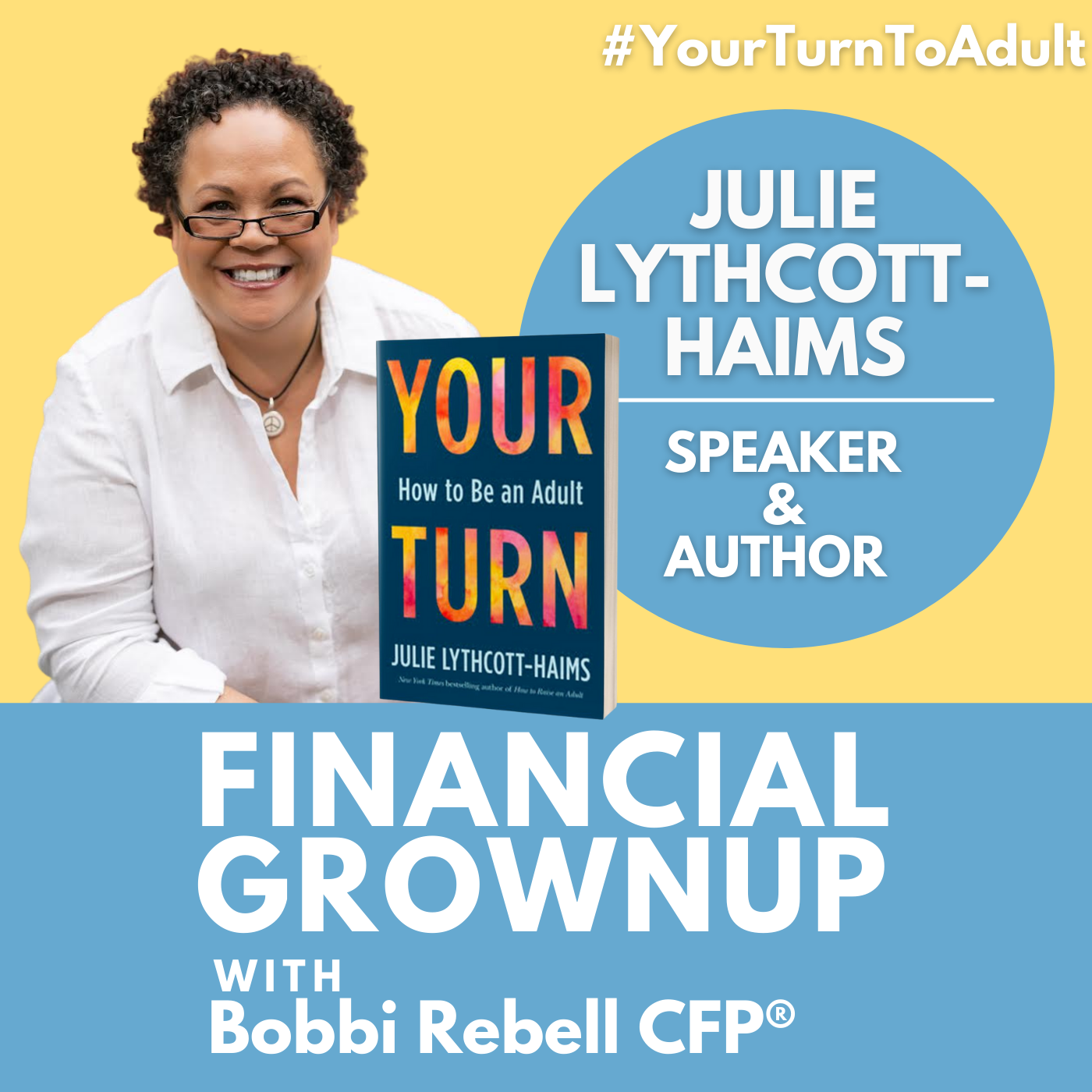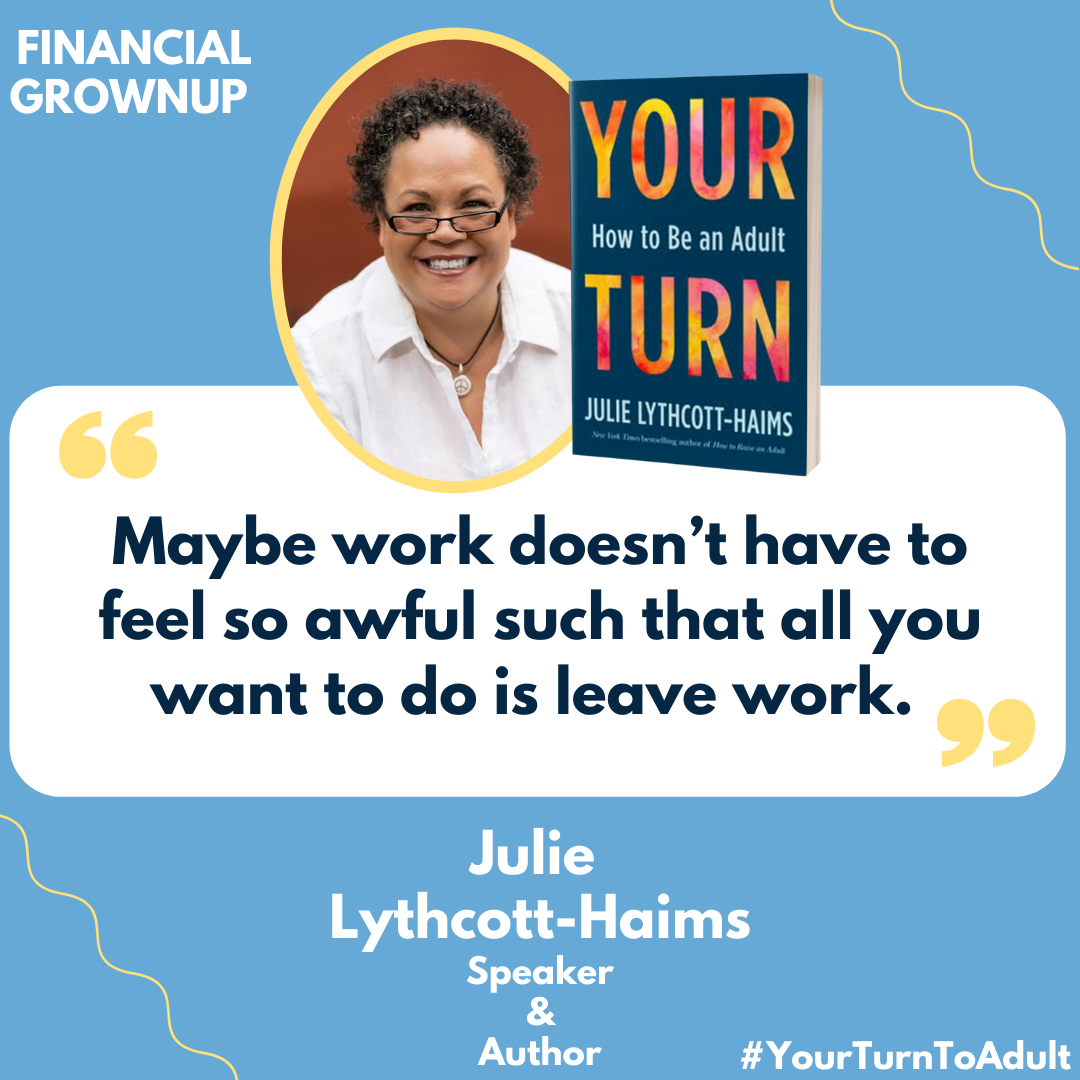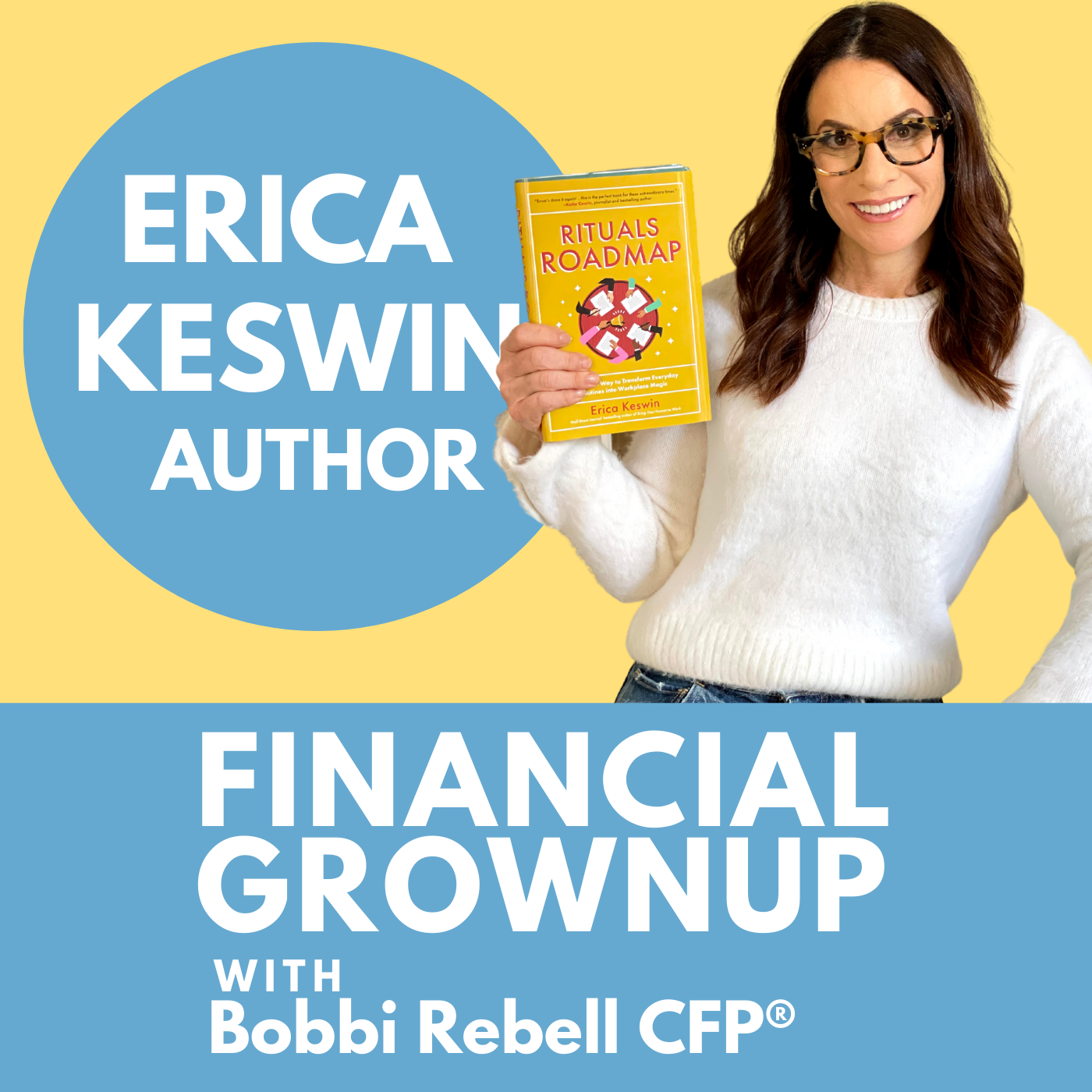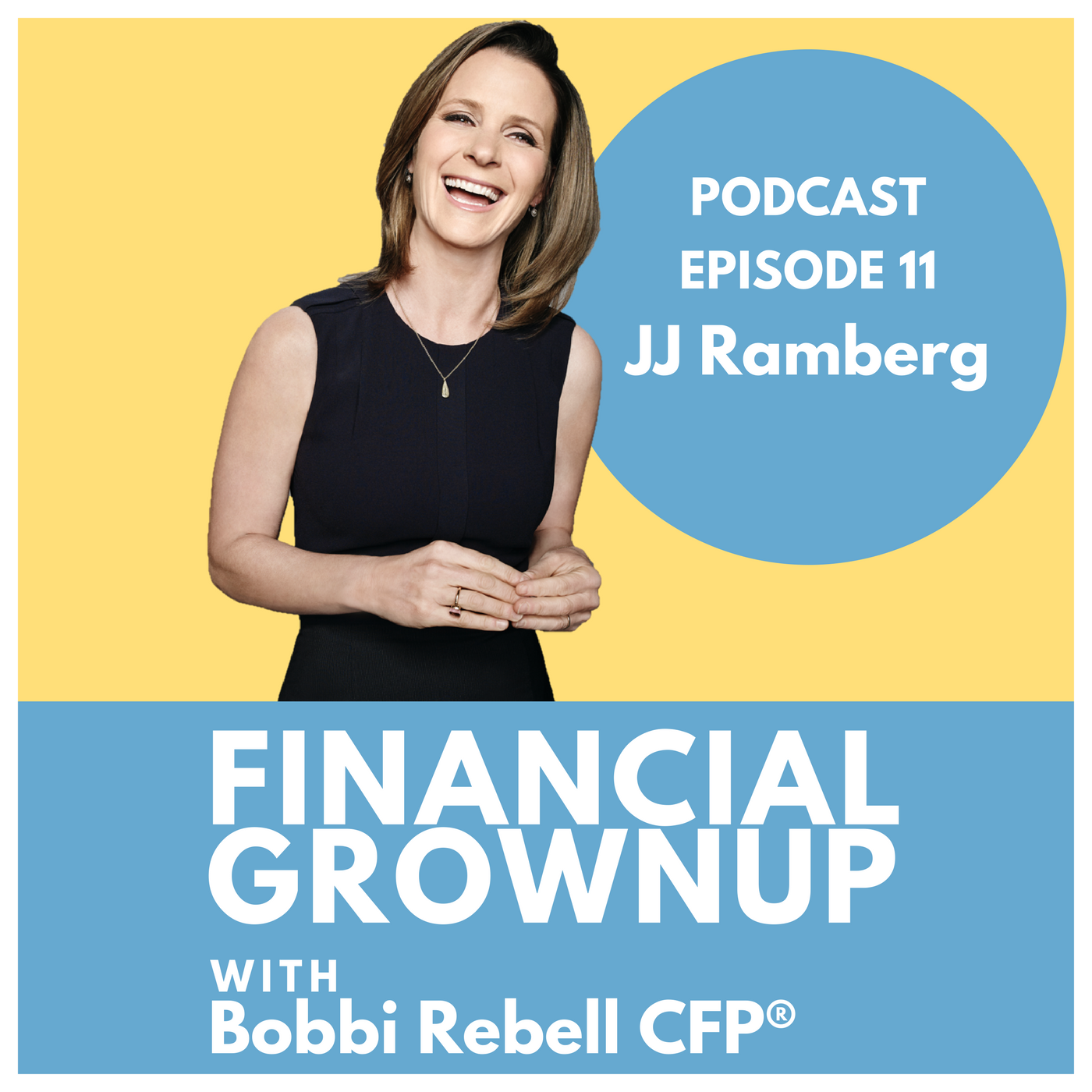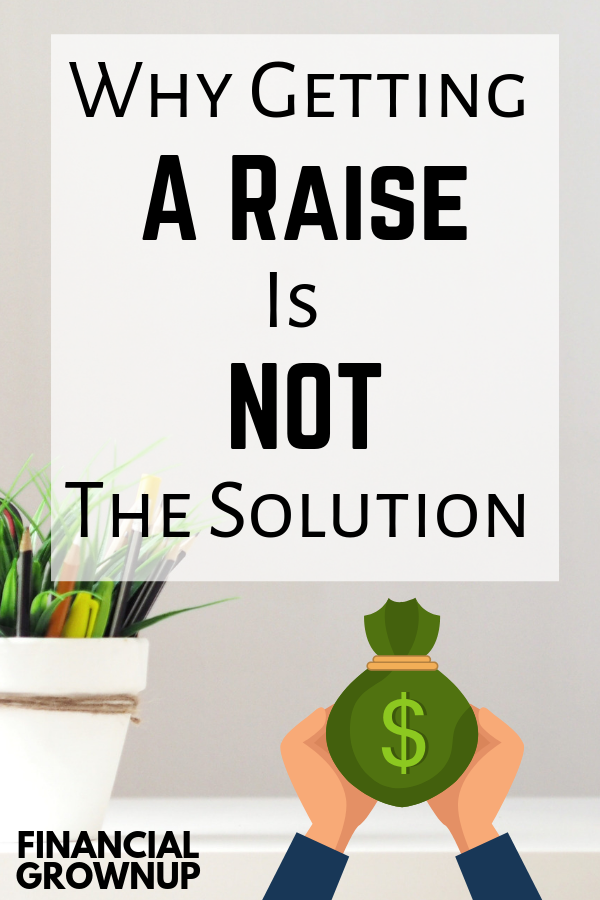The best-selling author reveals what happened when her dad opened her mail and saw her credit card debt, and the surprising result when she and her husband cut their budget by 90 percent. Plus a preview of her new book: Your Turn: How to be an Adult.
Julie’s Money Lesson:
Okay, the recliner. I'm starting to make a lot of money. I'm making enough that my husband is like, "How would you feel about me being a full-time artist?" And I was like, “Yes!”. I was supporting a family of four. My husband became a full-time artist and we started spending money. We're buying the nicer table. We're buying the nicer artwork. We're buying the nicer recliner. We realized that our set point of what we could just spend money on, in terms of discretionary spending, had just increased as our salary increased. We're looking around like we're making far more money than we ever had, but we're not saving a darn thing. What is up? And we realized that set point was just out of control. We were just dropping $1,000 without thinking about it. I read up, I talked to people and I learned this rule of if you want to save, you want to change your habits, you don't just try to start saving 5% or 10% if you've been saving nothing, you need to start saving for yourself first. You need to pay yourself first and decide what your savings goals are and set that to the side and then pay the rest of your bills. And that meant that our discretionary spending, we were going to cut by 95% or by 90%. If we were spending $1,000 on a recliner, when we had to buy the second recliner, it was going to be $100. And I was bummed because the second recliner was for me and my husband had the fancy recliner. We went to the cheaper furniture store and sat in recliners. And we had these down, sad faces, like “poor us” right? And I sound so privileged talking about this. I realize some people are like, "$100 is a lot of money." I'm just saying for me, it was a big cut. And then we found this recliner for $100 that is so comfortable. It is like the recliner of choice. You come to our house, everyone gravitates to it. It looks comfortable and it is comfortable. It's the kind of thing when you push the buttons and it starts to leans back, you're like, "Ah". It feels like a spa. And it's the cheapest thing in the whole downstairs of our house. Cut spending on something by 90% and see if you noticed.
Bobbi’s Takeaways:
#1 - Julie jokes about how retirement is over romanticized and I couldn't agree more. Work is not just a path to retirement. We put in about a third of our 24 hour day, and for many of us, a lot more than those eight hours. If you hate what you're doing so much, that you are laser focused on retirement, consider refocusing that energy on enjoying your day to day more. If there's anything we've learned during the pandemic, it's that we should not assume things need to stay the same. Hit pause, give yourself some grownup tough love and fix it.
#2 - Let's get better about asking our friends and colleagues of different backgrounds and races about their experiences with money. Even though Julie clearly and candidly talks about how being a person of color impacted her money decisions in the book, as a white person I wasn't sure about asking Julie about it. I'm really glad I did. I'm not sure why I was so hesitant. And I hope we can all make time to both listen and share with each other as well. And in case you're wondering, as a white person in this country, it never even occurred to me that I needed to use a credit card to prove I belonged in a store. We need to be talking about this.
Get your copy of YOUR TURN: How to Be an Adult today!
Follow Julie!
Instagram -@jlythcotthaims
Twitter- @jlythcotthaims
LinkedIn- Julie Lythcott-Haims
Website- www.julielythcotthaims.com
Follow Bobbi!
Instagram - @bobbirebell1
Twitter- @bobbirebell
LinkedIn- Bobbi Rebell
Website- http://www.bobbirebell.com/
Did you enjoy the show? We would love your support!
Leave a review on Apple Podcasts or wherever you listen to podcasts. We love reading what our listeners think of the show!
Subscribe to the podcast, so you never miss an episode.
Share the podcast with your family, friends, and co-workers.
Tag me on Instagram @bobbirebell1 and you’ll automatically be entered to win books by our favorite guests and merch from our Grownup Gear shop.
Full Transcript:
Bobbi Rebell:
It is officially spring. And that means graduation season is on. We here at The Financial Grownup Podcast have created some new super fun gifts just for that in our grownupgear.com merch store. We have adorable hats, totes, mugs, pillows, tees, and the seriously, most cozy and comfortable sweaters all on grownupgear.com and all at affordable prices. Grownup Gear also makes great gifts for Mother's Day, Father's Day, engagements, bachelor/bachelorette, parties birthdays, and of course, just for fun to treat yourself. Use code graduation for a 15% discount. And thank you in advance for your orders. Buying from our small business helps to support this free podcast, and we truly appreciate your support.
Julie Lythcott-Haims :
They handed me a check for the full amount, $3,900 plus change, and I felt so shamed and so just embarrassed. Here I am highly educated, a fancy degree from a fancy college and I'd managed to get so far in the hole. And I just cried. I just cried. Tears just rolled down my face.
Bobbi Rebell:
You're listening to Financial Grownup with me, certified financial planner, Bobbi Rebell, author of How to be a Financial Grownup. And you know what? Being a grownup is really hard, especially when it comes to money, but it's okay. We're going to get there together. I'm going to bring you one money story from a Financial Grownup, one lesson, and then my take on how you can make it your own. We got this. Hello, my grownup friends. It is April. I am so happy it's April. I don't know about you, but I just, I needed the better weather. Speaking to you from my home in New York City, where we've had a very brutal winter. I was fortunate. I got to go to Florida for a little bit, but we've been home for a while and this better weather could not come at a better time.
Bobbi Rebell:
And also, as some of you get to see, it's very much a work in progress, you see it on my Instagram, but I do get to go out and play golf, which is a really great way to spend time. Anyway, let's talk about this week's Financial Grownup. The adjective that I am going to use to describe her, delightful, Julie Lythcott-Haims is out with a new book, Your Turn: How to be an Adult. It is the much anticipated follow-up to her previous book, How to Raise an Adult, and not to be forgotten in between those, Real American: A Memoir, and a very personal book, which continues to grow in relevance.
Bobbi Rebell:
Julie is a former Stanford Dean. She left that position to pursue her passion, the career she'd always dreamed about, writing. You know what? It's working out okay. Julie's new book, Your Turn: How to be an Adult, is about more than just being a Financial Grownup, though she does have a chapter which is pretty much on the topic. Chapter eight, check it out. The book is about being a full on adult, but for the purposes of this podcast, she was a good sport and gets candid about her money blunders and victories. Here is Julie Lythcott-Haims. Julie Lythcott-Haims, you are a Financial Grownup. Welcome to the podcast.
Julie Lythcott-Haims :
Bobbi, no one's ever said that to me before. Thank you.
Bobbi Rebell:
You are very much a Financial Grownup. You're the author of Your Turn: How to be an Adult. Welcome.
Julie Lythcott-Haims :
Thank you. Thank you so much for having me. I'm excited to be here. I think I'm going to learn something.
Bobbi Rebell:
I'm going to ask you to share a money story from the book, which has to do with credit card debt, but there's a really interesting angle that has to do with how you relate to your family, which is so appropriate when we talk about Financial Grownups.
Julie Lythcott-Haims :
Yeah. Thanks for pointing to something that's deeply personal. No, of course. I shared it in the book.
Bobbi Rebell:
It's in the book, Julie.
Julie Lythcott-Haims :
I know. I'm trying to be vulnerable with my readers so that they can feel more safe and seen. Okay, picture me. I now 53, but in the story, I was maybe 22. I had amassed a lot of credit card debt in college. I was at Stanford University. The student union was basically lined with the desks of fakes who were there to offer me a credit card application. And I filled out maybe two of them. I had two credit cards. I would use my credit cards at the local shopping center. I would use them for groceries. I would use them for dinners and lunches out and coffee. I was just, I was spending money without having really learned the habits of how you keep track of your expenses and the whole interest part with credit cards. Long and short, I had accumulated about $3,900 in debt.
Julie Lythcott-Haims :
This would be around 1990, 1991. Maybe double that, maybe like $6,000, $7,000 in today's dollars. I had no way to pay it off. My first job I'd earned $20,000 a year. It's hard to pay down a debt of $3,000 when you're only earning $20,000 gross. And I was headed off to law school and was living with my parents over the summer before law school started. And so my mail, including my bills, was being forwarded to my parents' address. Well, unbeknownst to me, after I had opened the latest credit card bill showing just how much I owed, my parents had read it as well.
Julie Lythcott-Haims :
One night they just solemnly came toward me and said, "You're about to go start grad school and you're getting married. And we want you to start life with Dan", my boyfriend and soon to be husband, "with a financial clean slate. So here's a check." They handed me a check for the full amount, $3,900 plus change. And I felt so shamed. And so just embarrassed. Here I am highly educated, a fancy degree from a fancy college, and I'd managed to get so far in the hole and I just cried. I just cried. Tears just rolled down my face. They weren't judgmental. They weren't scolding me. They were offering me this gift.
Bobbi Rebell:
There's also another lesson for our listeners about relationships and how you communicate with your family.
Julie Lythcott-Haims :
Yeah. That really pushes the button, right? I think I was so ashamed that I had let them down by being this child of theirs who had been so irresponsible. And I think the lesson is had I only reached out sooner. I just kept digging the hole deeper and deeper by paying the minimum on my credit cards. If I had reached out to my parents six months earlier, or a year before, or two years before, I would probably never have gotten into such bad debt to start with.
Bobbi Rebell:
We're going to talk for your everyday money lesson about the fact that you guys like to splurge. But then there was sort of an aha moment. Tell us about the recliner.
Julie Lythcott-Haims :
Okay, the recliner. I'm starting to make a lot of money. I'm making enough that my husband, who's a designer, a product designer, user experience designer, is like, "How would you feel about me being a full-time artist?" And I was like, yes. Okay, that's how capable I was of supporting a family of four. My husband became a full-time artist and we started spending money. We're buying the nicer table. We're buying the nicer artwork. We're buying the nicer recliner.
Julie Lythcott-Haims :
We realized that our set point of what we could just spend money on, in terms of discretionary spending, had just increased as our salary increased. We're looking around like we're making far more money than we ever had, but we're not saving a darn thing. What is up? And we realized that set point was just out of control. We were just dropping $1,000 without thinking about it. I read up, I talked to people and I learned this rule of if you want to save, you want to change your habits, you don't just try to start saving 5% or 10% if you've been saving nothing, you need to start saving for yourself first.
Julie Lythcott-Haims :
You need to pay yourself first and decide what your savings goals are and set that to the side and then pay the rest of your bills. And that meant that our discretionary spending, we were going to cut by 95% or by 90%. If we were spending $1,000 on a recliner, when we had to buy the second recliner, it was going to be $100. And I was bummed because the second recliner was for me and my husband had the fancy recliner. We went to the cheaper furniture store and sat in recliners. And we had these down, sad faces, like poor us, we can only, right? And I sound so privileged talking about this. I realize some people are like,"$100 is a lot of money."
Julie Lythcott-Haims :
I'm just saying for me, it was a big cut. And then we found this recliner for $100 that is so comfortable. It is like the recliner of choice. You come to our house, everyone gravitates to it. It looks comfortable and it is comfortable. It's the kind of thing when you push the buttons and it starts to leans back, you're like, "Ah". It feels like a spa. And it's the cheapest thing in the whole downstairs of our house.
Bobbi Rebell:
But it's good. It's working for you and you saved 90%.
Julie Lythcott-Haims :
Yes.
Bobbi Rebell:
Nobody misses not spending the money.
Julie Lythcott-Haims :
That's right.
Bobbi Rebell:
It's so great. And yeah, the tip is basically cuts something by 90% and see if you noticed.
Julie Lythcott-Haims :
Right. That's right.
Bobbi Rebell:
Yeah. That's a good one.
Julie Lythcott-Haims :
100%. Yep.
Bobbi Rebell:
Let's talk more about this book. I devoured it. I have to say it's a robust book. This is a book that took a lot of research. I really encourage people, not only to read it, but to settle in with it because it really is worth your time. I picked out a few of the things that I'd like you to elaborate on within the book. And the first one kind of tag team to what we just talked about because there's a lot of talk about cutting your expenses so that you can retire early. That's one of the motivations for taking drastic action when it comes to spending. But you talk about the fact that retiring early is really over romanticized.
Julie Lythcott-Haims :
The retiring early rhetoric tends to be, "My job sucks. I can't wait to retire. I'm just going to slog away working in this dungeon so that I can at 55 or 57 or 60, whatever, I can kick back and relax and travel." If that's the choice you're making, more power to you. But in the book, I'm trying to expand people's horizons and get folks to think maybe work doesn't have to feel so awful, such that all you want to do is leave work. Maybe you can lead a career life, a job life, a professional life that is intrinsically rewarding. It feels good. You're tapping into your talents, your strengths, your loves, you're growing. You're making enough money to pay your bills.
Julie Lythcott-Haims :
And you're like, "Hey, I'm not eager to retire. I enjoy what I'm doing." And then to put a fine point on it, Bobbi, oftentimes when people retire, that is they cease doing that which they have always done, that which has been a huge part of their identity, they begin to wither psychologically. They begin to wither physically. They begin to wither in terms of their personal connections, because they're not making things with their hands, they're not doing as much with their brain and they're not seeing human beings as much. Retirement can often lead to a downward spiral. If one is not sort of healthy, hail and active in one's retirement, it can really be the beginning of the end.
Julie Lythcott-Haims :
I'm here to say, love the work you do, do the work you love, make sure it pays your bills and do it for as long as you can and build in the travel and the enjoyment and the fishing and all of that along the way, rather than waiting to live that life you imagined only after you've retired from some terrible job.
Bobbi Rebell:
Such a good reminder. Another thing that really stood out in the book that I went, oh, that I don't think about enough, when you talked about the spending, and this ties into your spending on the credit cards when you were younger especially, you talk about the fact that racial stereotypes played into your spending decisions. Tell us more.
Julie Lythcott-Haims :
Well, what listeners need to know is I'm a black and biracial woman, very light skin. But nevertheless, I think to the world, unambiguously of color. And most people figure out that I'm black. I, as a young person, had learned to ... I had internalized the hate that I had experienced along the way. Microaggressions, outright racism, these things were things I experienced in childhood. By the time I get to college and I'm at an elite college, I'm at Stanford University in Silicon Valley and I have these credit cards. I am using the credit cards when I'm in a store, in a fancy store, at the Stanford Shopping Center or in a nice restaurant as a way to demonstrate, I have credit, I am capable. You do not have to associate me with that stereotypical black person you think can't afford to purchase your goods, your food, because I have this credit card.
Julie Lythcott-Haims :
I was really deep in my internalized oppression that I was trying to not be the stereotypical black person. I was trying to be the model Negro, if you will, I'm using terms of stereotype. I have long since grown out of that behavior, but I will say, yeah, the credit card was like an appendage that was proving my ability or my worthiness or my right to be in these white environments. I overspent as a result, I'd be with friends at dinner and say like, you know what? I'll take care of the bill. And I'd plunk down my gold. How did I have a gold American Express card so young? But I did. They knew who they were preying on. It worked, right? I was like, I'll take care of the bill. And it was my way of showing, not just the restaurant, but my friends, I have money, even though I didn't necessarily have the money in the bank to pay that bill.
Bobbi Rebell:
It's a tough situation that society puts people in that mindset.
Julie Lythcott-Haims :
Yeah.
Bobbi Rebell:
We could talk about this a lot more, but this is a short podcast and I want to talk about one final theme. And that is that you really humanize a lot of our experiences with money by bringing stories of other people into the book. I wanted to ask you to share that a little bit.
Julie Lythcott-Haims :
Yeah. Thank you so much. The book is part memoir, me telling my lived experience, as you've just asked me about, me with some self-help tips, practical advice, but then I've got the stories of these other people in every chapter, a really diverse set of people from all walks of life in order to say to all readers, I'm trying to envision all of you as I write this. And the two stories in the money chapter are Wesley, who grew up working poor, put himself through community college, put himself into position of getting to drive for UPS and has been with UPS now for 35 years and will retire with a full pension from UPS.
Julie Lythcott-Haims :
It hearkens back to days of yore, when you'd work for one employer all your life, and they were very loyal to you and you were loyal to them and unions were strong and that's not really the way much of the working world works these days, but there are plenty of industries that still do offer pensions, like the package driving industry, like UPS and police and law enforcement more broadly and schools. People who work for the government tend to have a pension. And this is a way to the middle class. Wesley has provided a life for himself, his wife and his son that is just many steps above what he grew up with financially. I wanted that story in there. I think it's a really important story about the American dream and that in many ways it is alive and well today.
Julie Lythcott-Haims :
The other story is Denae, who's a dancer, got an undergraduate degree and a master's in dance. She's a professional dancer in New York City. She's done some amazing gigs, but dancing gigs come and they go. And when they go, she doesn't have income unless she supplements that with other work, which she does. Nevertheless, she had racked up with interest $50.000 in student loan debt, living in the most expensive city in America, New York, and or one of the most expensive, and she set herself a goal to get out of that credit card debt.
Julie Lythcott-Haims :
She said, "I'm going to be debt three and three years." And she did it by being extremely frugal about her food, extremely thoughtful and mindful about her choices, about how she went places, what kinds of places she rented. She would even say when she was working a temp job in between dancing gigs, somebody took her food out of the fridge and started eating it. And she put a note on the refrigerators, "Hey, please don't eat my food. I'm paying down my student loans." And if that wasn't crystal clear, because she didn't know who did it, but she just knew I have to send this message.
Julie Lythcott-Haims :
She stood up for herself, both to herself and to her friends and coworkers to say, "Hey, don't take my stuff. I'm paying off my student loan." Really brave. She did pay down that loan. Danced through the subway in a rented dress that she got from Rent the Runway with a big sign saying, "I'm debt-free. Hug me." And then she became a financial planner to help other people. When she's not dancing, she's now a certified financial planner person because she saw how many of her own peers, highly educated, didn't know enough about money. Here's to Denae, very much a resource for other people now that she is completely debt free.
Bobbi Rebell:
I am smiling ear to ear hearing that story. And there's so many other wonderful human stories in this book. We know it's going to be available everywhere. I won't have you say that, but where can people find out more about you and any virtual touring that you're going to be doing, my dear?
Julie Lythcott-Haims :
Thank you, Bobbi. The best way to be in touch with me is through my website, JulieLythcott-Haims.com. I'm sure Bobbi will put the spelling of that in the show notes. From there, you can follow me on social I'm @JLythcott-Haims everywhere. Maybe even Tik Tok, who knows, we'll see. I'm starting a membership club because I like to get real with people. I like to get really vulnerable and share. I know that that's the way we learn and grow and feel less lonely and I'm starting that. That's all online. Go to my website and just from there, you'll be able to follow me what I'm up to and all the virtual tour stuff will be on there as well.
Bobbi Rebell:
Well, thank you so much for this. Thank you for the book and thank you for joining us.
Julie Lythcott-Haims :
You're amazing. Thanks for having me. And I actually feel more competent about my financial choices and what I've learned from them because you helped me think it through, by walking through these stories with me. Thanks, Bobbi.
Bobbi Rebell:
They're all your stories. Thank you.
Julie Lythcott-Haims :
Thanks.
Bobbi Rebell:
Okay, my friends, here's my take. Financial Grownup tip number one, Julie jokes about how retirement is over romanticized And I couldn't agree more. Work is not just a path to retirement. We put in about a third of our 24 hour day, and for many of us, a lot more than those eight hours. If you hate what you're doing so much, that you are laser focused on retirement, consider refocusing that energy on enjoying your day to day more. If there's anything we've learned during the pandemic, it's that we should not assume things need to stay the same. Hit pause, give yourself some grownup tough love and fix it.
Bobbi Rebell:
Financial Grownup tip number two, let's get better about asking our friends and colleagues of different backgrounds and races about their experiences with money. Even though Julie clearly and candidly talks about how being a person of color impacted her money decisions in the book, as a white person I wasn't sure about asking Julia about it. I'm really glad I did. I'm not sure why I was so hesitant. And I hope we can all make time to both listen and share with each other as well. And in case you're wondering, as a white person in this country, it never even occurred to me that I needed to use a credit card to prove I belonged in a store. We need to be talking about this.
Bobbi Rebell:
It is Financial Literacy Month and I am giving away a ton of incredible books, including Julie's. You want one? All you have to do is DM me on Instagram @BobbiRebell1, and just say, "I'd love a book from a Financial Grownup". The authors that are on this podcast and their publishers are incredibly generous. And I can't wait to send out lots and lots of books. Everyone, pick up Your Turn: How to be an Adult and big thanks to Julie Lythcott-Haims for helping us all be Financial Grownups.
Bobbi Rebell:
The Financial Grownup Podcast is a production of BRK Media. The podcast is hosted by me, Bobbi Rebell, but the real magic happens behind the scenes with our team. Steve Stewart is our editor and producer and Amanda Savan is our talent coordinator and content creators. Yeah, that means she does the show notes you can get for every show right on our website and all the fantastic graphics that you can see on our social media channels. Our mission here at Financial Grownup is to help you be at your financial best in every stage of life.
Bobbi Rebell:
And this year we want to help you get there by giving away some of our favorite money books. To get yours, make sure you are on the Grownup list. Go-to BobbiRebell.com to sign up for free, while you're there, please check out our Grownup Gear Shop and help support the show by buying something to express your commitment to being a Financial Grownup. Stay in touch on Instagram @BobbiRebell1 and on Twitter @BobbiRebell. You can email us at hello@financialgrownup.com. And if you enjoyed the show, please tell a friend and maybe leave a review on Apple Podcasts. It only takes a couple minutes. Join us next time for more stories to help you live your best grownup life.



